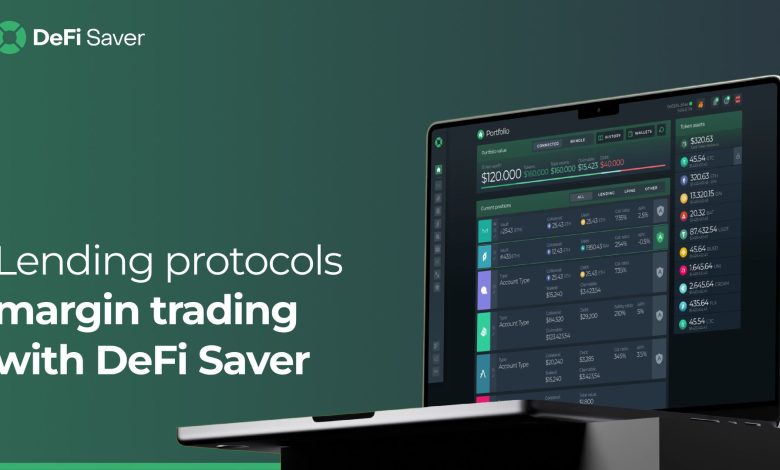Using DeFi for Margin Trading

- Understanding DeFi and its role in margin trading
- Exploring the benefits of using DeFi for margin trading
- Risks and challenges of utilizing DeFi in margin trading
- Comparing traditional margin trading with DeFi margin trading
- Tips for successful margin trading using DeFi platforms
- Regulatory considerations when engaging in DeFi margin trading
Understanding DeFi and its role in margin trading
Decentralized Finance (DeFi) plays a crucial role in margin trading by providing users with access to a wide range of financial services without the need for traditional intermediaries. DeFi platforms utilize smart contracts to automate processes such as lending, borrowing, and trading, allowing users to engage in margin trading with greater efficiency and transparency.
One of the key advantages of using DeFi for margin trading is the ability to access leverage without relying on centralized exchanges or brokers. This gives traders more control over their funds and reduces the risk of counterparty default. Additionally, DeFi platforms often offer lower fees compared to traditional margin trading services, making them a cost-effective option for traders.
By leveraging DeFi protocols, traders can access a wide range of assets for margin trading, including cryptocurrencies, stablecoins, and tokenized assets. This provides greater flexibility and diversification opportunities for traders looking to optimize their trading strategies and manage risk effectively.
Furthermore, DeFi platforms typically operate 24/7, allowing traders to engage in margin trading at any time without being restricted by traditional market hours. This flexibility can be particularly advantageous for traders looking to capitalize on market opportunities as they arise.
In conclusion, DeFi plays a vital role in margin trading by offering users a decentralized, efficient, and cost-effective alternative to traditional financial services. By leveraging DeFi protocols, traders can access leverage, diversify their portfolios, and optimize their trading strategies with greater control and transparency.
Exploring the benefits of using DeFi for margin trading
Exploring the advantages of utilizing decentralized finance (DeFi) for margin trading can provide numerous benefits for traders looking to maximize their returns and minimize risks. DeFi platforms offer a more secure and transparent way to engage in margin trading compared to traditional centralized exchanges. By leveraging smart contracts and blockchain technology, DeFi eliminates the need for intermediaries, reducing the risk of fraud and manipulation.
One of the key benefits of using DeFi for margin trading is the ability to access a wider range of assets and markets. DeFi platforms allow traders to trade a variety of cryptocurrencies and tokens that may not be available on centralized exchanges. This opens up new opportunities for diversification and potentially higher returns on investment.
Furthermore, DeFi margin trading typically offers lower fees compared to traditional exchanges, making it a more cost-effective option for traders. With lower fees, traders can keep more of their profits and reinvest them to further grow their portfolios. Additionally, DeFi platforms often provide more flexibility in terms of leverage options, allowing traders to customize their trading strategies to suit their risk tolerance and investment goals.
Risks and challenges of utilizing DeFi in margin trading
When considering the risks and challenges of utilizing DeFi in margin trading, it is important to be aware of the potential drawbacks that come with this innovative approach. While DeFi offers many benefits such as decentralization and accessibility, there are also several risks that traders should be mindful of.
- One of the main risks of using DeFi for margin trading is the volatility of the cryptocurrency market. Prices can fluctuate rapidly, leading to significant losses if the market moves against a trader’s position.
- Another challenge is the security of DeFi platforms. While blockchain technology is generally considered secure, there have been instances of hacks and vulnerabilities in DeFi protocols that have resulted in the loss of funds.
- Additionally, the lack of regulation in the DeFi space can make it difficult to resolve disputes or recover lost funds in the event of a problem. Traders should be cautious and conduct thorough research before engaging in margin trading using DeFi platforms.
- Furthermore, the complexity of DeFi protocols and smart contracts can pose a challenge for less experienced traders. It is important to have a solid understanding of how these systems work to avoid costly mistakes.
In conclusion, while DeFi offers exciting opportunities for margin trading, it is essential to approach this new technology with caution and be aware of the risks involved. By staying informed and taking appropriate precautions, traders can mitigate the challenges associated with using DeFi in margin trading.
Comparing traditional margin trading with DeFi margin trading
When comparing traditional margin trading with DeFi margin trading, there are several key differences to consider. In traditional margin trading, users rely on centralized exchanges to borrow funds and leverage their positions. This process often involves lengthy approval times, high fees, and limited flexibility in terms of collateral options. On the other hand, DeFi margin trading allows users to access margin trading services directly through decentralized platforms, eliminating the need for intermediaries and providing greater control over their funds.
One of the main advantages of DeFi margin trading is the ability to trade without relying on a centralized authority. This decentralized approach reduces counterparty risk and enhances security, as users retain ownership of their assets throughout the trading process. Additionally, DeFi margin trading offers a wider range of assets for collateralization, allowing users to leverage a diverse portfolio to maximize their trading opportunities.
Another key difference between traditional margin trading and DeFi margin trading is the level of transparency and accessibility. DeFi platforms operate on public blockchains, providing users with real-time access to trading data and transaction history. This level of transparency enhances trust and accountability within the ecosystem, fostering a more open and inclusive trading environment for all participants.
Overall, DeFi margin trading offers a more efficient, secure, and transparent alternative to traditional margin trading. By leveraging decentralized platforms and blockchain technology, users can access margin trading services with greater ease and flexibility, while minimizing counterparty risk and maximizing their trading potential.
Tips for successful margin trading using DeFi platforms
When engaging in margin trading using DeFi platforms, it is essential to follow certain tips to increase your chances of success. Here are some key strategies to keep in mind:
- Research: Before diving into margin trading, make sure to thoroughly research the DeFi platform you plan to use. Understand how the platform works, its fees, and its reputation in the market.
- Risk Management: Set clear stop-loss orders to limit potential losses. It is crucial to manage your risk effectively to avoid significant financial setbacks.
- Diversification: Avoid putting all your funds into a single trade. Diversifying your investments can help spread risk and protect your capital.
- Stay Informed: Keep up to date with market trends and news that could impact your trades. Being informed can help you make better decisions.
- Start Small: If you are new to margin trading, consider starting with a small amount of capital. This will allow you to gain experience without risking too much.
By following these tips, you can improve your chances of success when margin trading using DeFi platforms. Remember that margin trading carries inherent risks, so always proceed with caution and never invest more than you can afford to lose.
Regulatory considerations when engaging in DeFi margin trading
When engaging in DeFi margin trading, it is crucial to consider the regulatory implications that may arise. DeFi platforms operate in a decentralized manner, which can make it challenging for regulators to enforce compliance with existing financial laws. However, it is essential for traders to be aware of the potential risks and legal considerations involved in DeFi margin trading.
One key regulatory consideration is the lack of oversight and investor protection in the DeFi space. Unlike traditional financial markets, DeFi platforms do not have the same level of regulation or safeguards in place to protect traders from fraud or market manipulation. This means that traders must be cautious and conduct thorough due diligence before participating in DeFi margin trading.
Additionally, the anonymity and pseudonymity offered by DeFi platforms can make it difficult for regulators to identify and prosecute bad actors. This lack of transparency can create opportunities for illicit activities, such as money laundering or terrorist financing. Traders should be mindful of the potential legal consequences of engaging in DeFi margin trading and ensure that they are not unknowingly participating in illegal activities.




